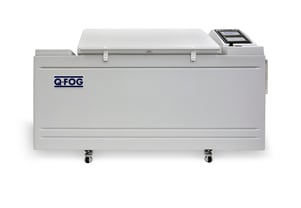
In the realm of materials engineering, the battle against corrosion is both a challenge and a necessity. As industries strive to create products that withstand the test of time, corrosion testing emerges as a crucial step in ensuring the suitability, longevity and reliability of materials. One of the most renowned and comprehensive methods for corrosion testing is the ASTM B117 salt spray prohesion test. In this blog, we will delve into the importance of this method and how it contributes to safeguarding materials against the relentless force of corrosion.
Thermoline is the exclusive distributor of the Q-Lab testers for Australia and New Zealand. The Q-lab Q-FOG SSP corrosion tester is available in two sizes (600 litre and 1100 litre)
Understanding ASTM B117
ASTM B117, established by the American Society for Testing and Materials (ASTM), outlines the standard practice for operating salt spray (fog) apparatus to assess the corrosion resistance of materials. The salt spray test involves exposing specimens to a controlled saline environment to replicate the corrosive conditions materials might encounter in real-world settings. This testing method is widely recognized and applied in industries such as aerospace, automotive coatings, marine coatings, and electronics to evaluate the ability of materials to withstand corrosion.
The Power of Salt Spray Prohesion Testing
The ASTM B117 test offers a comprehensive corrosion testing approach, and within it, the salt spray prohesion testing takes the spotlight. This method involves cyclic exposure to salt spray followed by periods of drying. The cyclic nature of the test simulates the dynamic conditions that materials experience in actual environments, such as coastal or industrial settings. By incorporating drying periods, the test mimics the process of corrosion product accumulation, providing a more accurate prediction of material performance over time.
Benefits of ASTM B117 Salt Spray Prohesion Testing
1. Realistic Simulation: Salt spray prohesion testing under ASTM B117 guidelines provides a more accurate simulation of material behaviour in real-world environments, helping engineers anticipate how materials will withstand corrosion over time.
2. Accelerated Evaluation: While natural corrosion can take years to manifest, salt spray prohesion testing accelerates the process, allowing for quicker assessments of a material's susceptibility to corrosion.
3. Comparative Analysis: The method allows for easy comparison between different materials, coatings, or treatments, enabling informed decisions about which are best suited for specific applications.
4. Adherence to Industry Standards: Industries rely on ASTM B117 to ensure consistency, quality, and compliance with standards and regulations, contributing to the overall reliability of products.
5. Cost-Efficiency: Detecting potential corrosion issues early on through salt spray prohesion testing can prevent costly repairs, replacements, and downtime in the long run.
ASTM B117 in Action
In practice, ASTM B117 involves placing specimens in a salt spray chamber where they are exposed to a saltwater mist. The cycle of exposure and drying continues over a specified period, typically ranging from hours to hundreds of hours. Researchers then evaluate the extent of corrosion and deterioration, often using visual examination, weight loss measurements, or specialized equipment.
Conclusion
Corrosion testing is a cornerstone of materials engineering, safeguarding the durability and performance of products across industries. ASTM B117 salt spray prohesion testing stands as a beacon in this field, providing a comprehensive and realistic approach to evaluating materials' resistance to corrosion. By subjecting materials to cyclic salt spray exposure and drying, this method offers insights into how materials will endure the relentless forces of corrosion over time. As industries continue to innovate, the lessons learned from ASTM B117 testing enable engineers and manufacturers to design products that stand strong against corrosion, ensuring a safer, more reliable future.
If you have any questions at all on the range of Q-FOG testers, please get in touch with our sales team.






